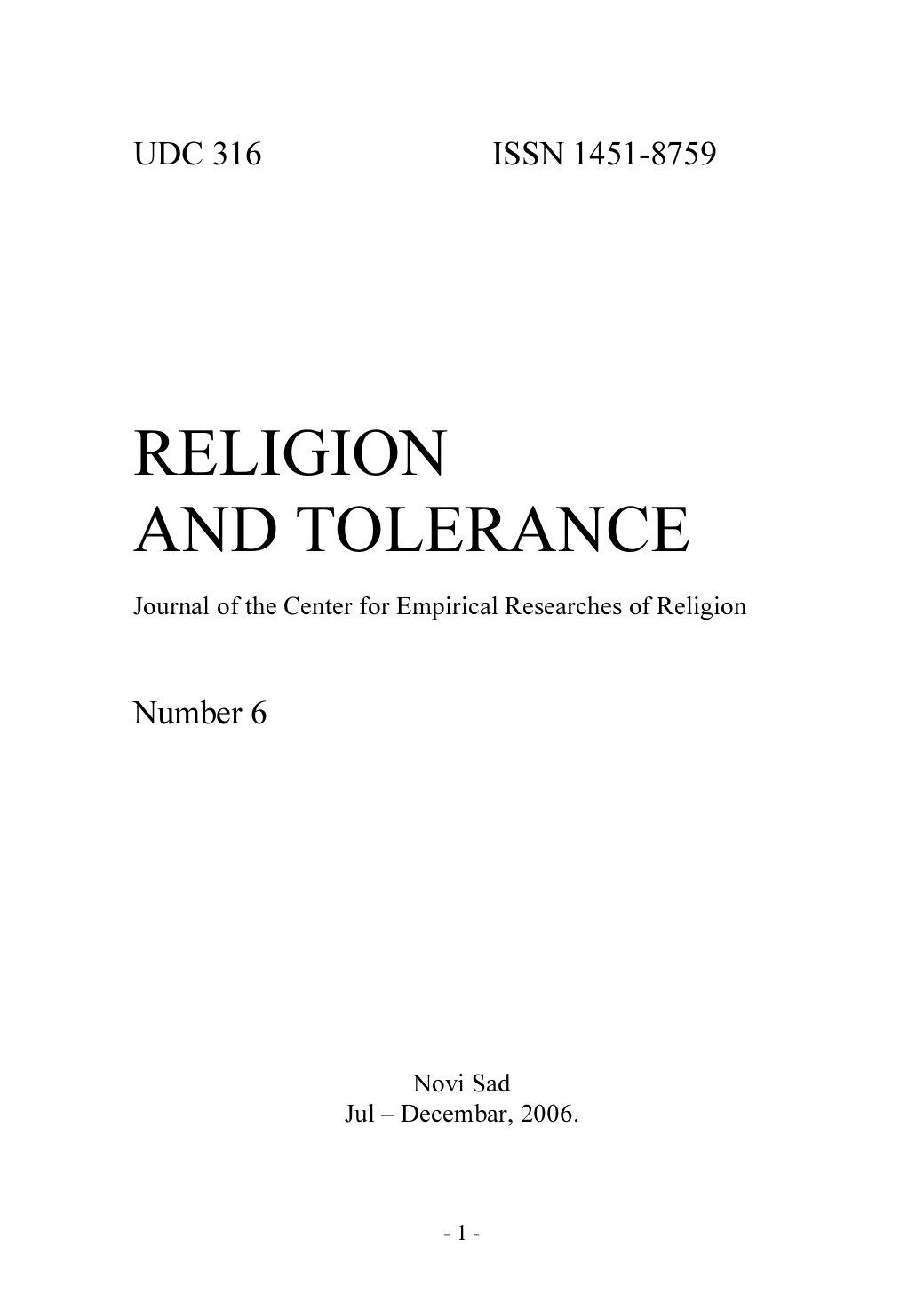IS THERE AN AMERICAN CREED? MASTERY IN TOLERANCE
IS THERE AN AMERICAN CREED? MASTERY IN TOLERANCE
Author(s): Nikola SamardžićSubject(s): Politics / Political Sciences, Theology and Religion, Religion and science , Sociology of Religion
Published by: Centar za empirijska istraživanja religije (CEIR)
Keywords: religious community; science and religion; church and state; America
Summary/Abstract: Theocratic convictions in absolute rightness, occasionally even serene religious sentiments, located in front of concrete political and economic interests, still animate ethnic disputes and international conflicts. Contemporary southeastern European mess of independent states and those under international custody has emerged from a historical sequence of skirmishes within an extensive chauvinistic framework. On traditional boundaries of three dominant denominations (Catholicism, Eastern Orthodoxy and Islam), modern collective identities have been designated by convictions in particularity and purity of ethnic provenience, sustained by sharp religious assignment, not always meaning a deep and sincere devotion. Especially the entities scarcely differentiated by language and genealogical descent have equalized their ethnic and religious appropriation. Even under custody of modern powers, rudimentary and troublous ethnic communities remained too remote from currents of modernity. In such terms, the second, possibly definite disintegration of Yugoslavia has sometimes been considered as a failure of initial project, conceived by the same victorious allies in two world wars together with the USA, of a multicultural, presumably democratic experiment. Experiment that hasn’t succeeded, during the collapse of the eastern communist confederation, to carry out a democratic and liberal transition, the union perished in its internal, purposeless disputes, in another butchery of civil, ethnic and religious war. Although religious communities are historically associated with non-democratic and antiliberal forces, in most of the contemporary civilized societies the need for a separation of the church and the state has been accomplished almost entirely. (In Northern Ireland, along with the poverty, only in the last two decades religious troubles caused a violent death of more than two thousand persons.) While in Europe, and elsewhere, dominate the churches, in the USA the religious life is mostly contained by the sects. The churches, in structure, are hierarchical, founded on traditional authority. Sects are predominantly congregational. In Europe, religious orientation is mostly ancestry, inherited, and derived from the family. In the USA that must not be a case, since individuals are asked to make a religious commitment only upon reaching the age of decision. In Europe, churches are historically linked to the state. American Protestant sectarianism has strengthened social, economic and political individualism. Generally, American sects are running an optimistic view on human nature, while traditionalist societies both human nature and human institutions consider weak, corrupt and immoral. American religion "demonstrates many of the characteristics that theorists have identified with modern culture." In Europe, the efforts to introduce a church into the deepest structures of contemporary life usually fail, and sometimes appear grotesque. Europe and the USA also differ in the patterns of individual and collective identities. European culture has risen mostly from ethnic and regional communities (these regional structures have been partly translated in USA, especially in the early colonial period). Max Weber already emphasized that the USA was the only purely bourgeois country, the only which was not post-feudal, that skipped the predominance of church establishment and aristocracy. He stated that the Protestantism facilitated the rise of capitalism, while the liberal orientation derived from its specific religious tradition in the sense that the sectarian beliefs appeared as the most conducive to the kind of rational, competitive, individualistic behavior. In impossibility, each of them, to assign its predominance, the most of the American sects evolved as congregational, not hierarchical communities, fostering egalitarian, populist, anti-elitist values. While in much of Europe liberal politics came to be associated with direct opposition to the clergy and the Christianity, and the secularization of the state even got definite anti-Christian implications, in America took place a gradual and largely peaceful differentiation of religious and secular domains.
Journal: Religija i tolerancija
- Issue Year: 2006
- Issue No: 6
- Page Range: 57-70
- Page Count: 14
- Language: English

